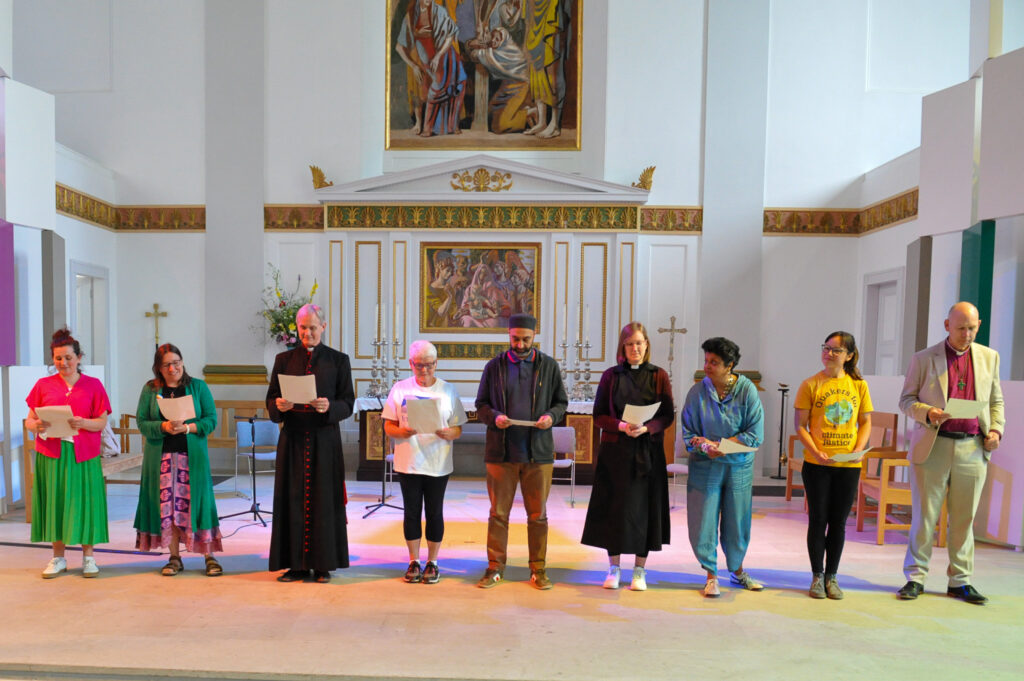
Climate change, conflict and freedom of religion and belief
At our Sept 2024 network meeting – which you can watch here – Lizzie Nelson from Search for Common Ground detailed the findings of their recent report on climate, conflict and freedom of religion. In this blog, one of the co-authors of the report, Daniel Ekomo-Soignet, explains the importance of understanding climate as a conflict multiplier, how interfaith action can foster peace and resilience and some policy recommendations.
While the faith imperative to climate action is clear to many of us, the connection between climate change and the universal right to Freedom of Religion and Belief (FoRB) is not something that has been fully understood. Climate change is not just an environmental issue; it is a risk multiplier for conflict and a threat to FoRB; but solutions can be built to address both climate and FoRB challenges simultaneously.
Elizabeth Nelson, a Greenfaith Fellow and UK Director for international peacebuilding organisation Search for Common Ground (Search), presents a new, thought-provoking policy report underscoring the urgent need for policymakers to integrate climate change considerations with Freedom of Religion or Belief (FoRB) to address the root causes of conflict and foster resilience in vulnerable communities. The report leverages the expertise of Search for Common Ground’s over two decades of religious engagement in peacebuilding with the expertise of our partner organisations from around the world, including the work of Eco Bhinneka in Indonesia, led by Greenfaith Fellow Hening Parlan.
Climate change is increasingly recognised as a risk multiplier for atrocities and a driver of conflict, particularly in fragile contexts, where 40-60% of civil wars in the past 60 years are estimated to have been triggered by conflicts over natural resources. The impact of climate change – both direct and indirect – on the universal human right to freedom of religion and belief, however, has not yet been clearly articulated. Rather than recognising their intersectionality, these two issues are siloed, and sometimes even seen as competing explanations for a conflict’s root causes. As a result, practitioners and policy makers lose out on valuable opportunities to combat both climate change and FoRB violations simultaneously.
The reality is that these issues are linked, both as challenges, and in terms of solutions. Governments and international agencies building mitigation and adaptation plans to deal with climate change need to ensure they are both conflict and religion sensitive – to ensure that the benefits and costs of adaptation don’t exacerbate existing religious or ethnic conflicts. Religious leaders are increasingly focusing on our shared concern for the Earth through interfaith action on climate change, contributing at community, national and international levels to social cohesion. Policy makers therefore need to take an integrated approach to climate change and FoRB for all by investing both in sensitive adaptation and mitigation, and interfaith action on climate change at the community level, to build on the potential for win-win solutions.
The work of many organisations around the world taking environmental action to build respect and understanding across faiths are highlighted in this report. In India, Go Dharmic works across religious divides to help restore the Sundarbans, West Bengal’s wetland forests, by bringing together women from Muslim, Christian, Hindu, and traditional backgrounds together to plant two million mangroves. In Kenya, the Kaya forest has been subjected to illegal deforestation and land grabbing, jeopardising Kaya traditions and their ancestral places of worship. Through the Joint Initiative for Strategic Religious Action (JISRA) program, Search for Common Ground Kenya facilitated a dialogue among stakeholders regarding the protection of their sacred sites which successfully empowered Kaya elders to independently host interfaith and inter-community activities, establishing them as indispensable figures in public discourse. These activities also emphasised Kaya sacred grounds as neutral spaces for dialogue, underscoring their importance for all communities.
This policy report demonstrates that complementary climate and FoRB programming leads to positive outcomes and more sustainable results for communities in conflict, and suggests that donors, policymakers, and implementing organisations can break down silos, support complementary approaches, and reduce both climate and FoRB risks through:
- Involving multi-faith religious actors in climate initiatives at the local and global level
- Ensuring in policy making that focus on one aspect of a conflict does not inadvertently downplay or exacerbate other root drivers.
- Increasing funding opportunities for programmatic work where climate change and FoRB are addressed simultaneously
- Integrating religious and conflict sensitivity in climate programming, and climate sensitivity in FoRB programming
- Carrying out further research on the interconnections between climate change, conflict and FoRB
Published on 3 Oct 2024
